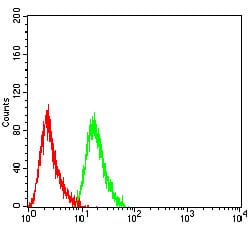

| WB | 咨询技术 | Human,Mouse,Rat |
| IF | 咨询技术 | Human,Mouse,Rat |
| IHC | 咨询技术 | Human,Mouse,Rat |
| ICC | 技术咨询 | Human,Mouse,Rat |
| FCM | 1/200 - 1/400 | Human,Mouse,Rat |
| Elisa | 1/10000 | Human,Mouse,Rat |
| Aliases | LIFR; SWS; SJS2; STWS; LIF-R |
| Entrez GeneID | 3977 |
| clone | 5D3G12 |
| WB Predicted band size | 123.7kDa |
| Host/Isotype | Mouse IgG1 |
| Antibody Type | Primary antibody |
| Storage | Store at 4°C short term. Aliquot and store at -20°C long term. Avoid freeze/thaw cycles. |
| Species Reactivity | Human |
| Immunogen | Purified recombinant fragment of human PLA2G7 (AA: 22-441) expressed in E. Coli. |
| Formulation | Purified antibody in PBS with 0.05% sodium azide |
+ +
以下是关于CD118(IFNAR)抗体的3篇参考文献的简要整理:
---
1. **文献名称**: *Interferon-α/β Receptor Signaling Promotes Antiviral Responses in Respiratory Syncytial Virus Infection*
**作者**: Schneider WM 等
**摘要**: 本研究探讨了干扰素α/β受体(IFNAR/CD118)在呼吸道合胞病毒(RSV)感染中的抗病毒作用。通过使用CD118抗体阻断IFNAR信号通路,发现宿主对病毒的清除能力显著降低,表明IFNAR信号对先天免疫应答至关重要。
2. **文献名称**: *Targeting IFN-α/β Signaling in Autoimmunity: Therapeutic Effects of Anti-IFNAR Antibodies*
**作者**: Higgs R 等
**摘要**: 文章评估了CD118抗体在系统性红斑狼疮(SLE)模型中的治疗效果。实验显示,阻断IFNAR信号可减少自身抗体产生并缓解器官损伤,提示靶向该受体可能是治疗Ⅰ型干扰素依赖型自身免疫疾病的有效策略。
3. **文献名称**: *IFNAR1-Specific Antibodies Enhance Interferon Signaling in Tumor Microenvironments*
**作者**: García-Sastre A 等
**摘要**: 研究团队开发了一种靶向IFNAR1(CD118)的单克隆抗体,发现其能增强肿瘤微环境中的干扰素信号传导,抑制黑色素瘤生长并改善免疫细胞浸润,为癌症免疫治疗提供了新思路。
---
以上文献均聚焦于CD118(IFNAR)抗体的功能研究,涵盖病毒感染、自身免疫病及肿瘤治疗等领域。如需具体文献来源(期刊、年份等),可进一步补充关键词进行检索。
**Background of CD118 Antibody**
The CD118 antibody targets the CD118 antigen, a cell surface protein also known as the **leukemia inhibitory factor receptor beta (LIFRβ)**. CD118 is a subunit of the LIF receptor complex, which forms a heterodimer with glycoprotein 130 (gp130), a shared signal-transducing component of the interleukin-6 (IL-6) cytokine family. This receptor plays a critical role in mediating cellular responses to ligands like leukemia inhibitory factor (LIF) and oncostatin M (OSM), regulating processes such as cell differentiation, proliferation, and survival.
CD118 is expressed in various tissues, including immune cells, neurons, and stem cells, and is implicated in embryonic development, neurogenesis, and immune regulation. Dysregulation of LIFR signaling has been linked to cancer progression, inflammatory diseases, and neurodegenerative conditions.
CD118 antibodies are essential tools for studying receptor localization, expression levels, and signaling mechanisms. They are widely used in **immunohistochemistry (IHC)**, **flow cytometry**, and **Western blotting** to investigate LIFRβ's role in disease models or therapeutic contexts. In cancer research, CD118 antibodies help explore its dual role as both a tumor suppressor and promoter, depending on cellular context. Additionally, they support the development of targeted therapies, such as blocking antibodies or ligand traps, to modulate LIFR-mediated pathways in autoimmune disorders or malignancies.
Overall, CD118 antibodies provide valuable insights into the biology of cytokine receptors and their translational potential in medicine.
×